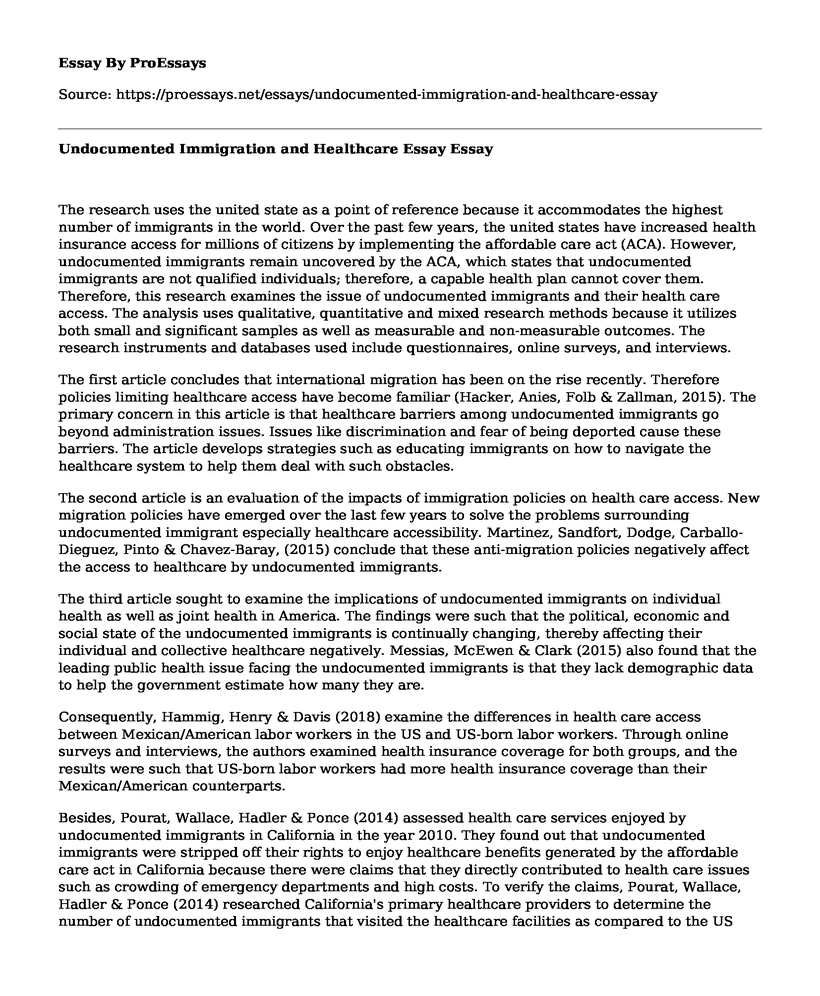The research uses the united state as a point of reference because it accommodates the highest number of immigrants in the world. Over the past few years, the united states have increased health insurance access for millions of citizens by implementing the affordable care act (ACA). However, undocumented immigrants remain uncovered by the ACA, which states that undocumented immigrants are not qualified individuals; therefore, a capable health plan cannot cover them. Therefore, this research examines the issue of undocumented immigrants and their health care access. The analysis uses qualitative, quantitative and mixed research methods because it utilizes both small and significant samples as well as measurable and non-measurable outcomes. The research instruments and databases used include questionnaires, online surveys, and interviews.
The first article concludes that international migration has been on the rise recently. Therefore policies limiting healthcare access have become familiar (Hacker, Anies, Folb & Zallman, 2015). The primary concern in this article is that healthcare barriers among undocumented immigrants go beyond administration issues. Issues like discrimination and fear of being deported cause these barriers. The article develops strategies such as educating immigrants on how to navigate the healthcare system to help them deal with such obstacles.
The second article is an evaluation of the impacts of immigration policies on health care access. New migration policies have emerged over the last few years to solve the problems surrounding undocumented immigrant especially healthcare accessibility. Martinez, Sandfort, Dodge, Carballo-Dieguez, Pinto & Chavez-Baray, (2015) conclude that these anti-migration policies negatively affect the access to healthcare by undocumented immigrants.
The third article sought to examine the implications of undocumented immigrants on individual health as well as joint health in America. The findings were such that the political, economic and social state of the undocumented immigrants is continually changing, thereby affecting their individual and collective healthcare negatively. Messias, McEwen & Clark (2015) also found that the leading public health issue facing the undocumented immigrants is that they lack demographic data to help the government estimate how many they are.
Consequently, Hammig, Henry & Davis (2018) examine the differences in health care access between Mexican/American labor workers in the US and US-born labor workers. Through online surveys and interviews, the authors examined health insurance coverage for both groups, and the results were such that US-born labor workers had more health insurance coverage than their Mexican/American counterparts.
Besides, Pourat, Wallace, Hadler & Ponce (2014) assessed health care services enjoyed by undocumented immigrants in California in the year 2010. They found out that undocumented immigrants were stripped off their rights to enjoy healthcare benefits generated by the affordable care act in California because there were claims that they directly contributed to health care issues such as crowding of emergency departments and high costs. To verify the claims, Pourat, Wallace, Hadler & Ponce (2014) researched California's primary healthcare providers to determine the number of undocumented immigrants that visited the healthcare facilities as compared to the US citizens in the state of California.
The authors also sought to determine the health costs incurred by both groups. Their findings found these claims baseless because the undocumented immigrants made an equal number of visits to emergency departments as the US patients and the healthcare costs incurred by undocumented immigrants were even lower than those committed by US citizens.
References
Hacker, K., Anies, M., Folb, B. L., & Zallman, L. (2015). Barriers to health care for undocumented immigrants: a literature review. Risk management and healthcare policy, 8, 175
Hammig, B., Henry, J., & Davis, D. (2018). Disparities in Health Care Coverage Among US Born and Mexican/Central American Born Labor Workers in the US. Journal of immigrant and minority health, 1-7.
Martinez, O., Wu, E., Sandfort, T., Dodge, B., Carballo-Dieguez, A., Pinto, R., ... & Chavez-Baray, S. (2015). Evaluating the impact of immigration policies on health status among undocumented immigrants: a systematic review. Journal of Immigrant and Minority Health, 17(3), 947-970.
Messias, D. K. H., McEwen, M. M., & Clark, L. (2015). The impact and implications of undocumented immigration on individual and collective health in the United States. Nursing Outlook, 63(1), 86-94.
Pourat, N., Wallace, S. P., Hadler, M. W., & Ponce, N. (2014). Assessing health care services used by California's undocumented immigrant population in 2010. Health Affairs, 33(5), 840-847.
Cite this page
Undocumented Immigration and Healthcare Essay. (2022, Jul 08). Retrieved from https://proessays.net/essays/undocumented-immigration-and-healthcare-essay
If you are the original author of this essay and no longer wish to have it published on the ProEssays website, please click below to request its removal:
- Technology and Crime Essay Example
- Punishment and Society Essay Example
- A Chronic Care Model to Curb Chronic Conditions Essay Example
- Paper Example on High Healthcare Costs: An Imperfect US Health Care Market
- Essay Example on Nurses: Navigating Multiplex Issues With Ethical Codes
- Essay Sample on Government Policies for Effective Response to Global Pandemic
- Essay Example on Murder Investigation at 123 Harriet Avenue, Key West







